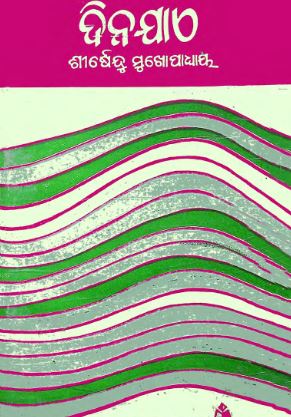In the ever-evolving tapestry of Indian literature, certain works act as bridges, tying together diverse regional threads into a cohesive cultural mosaic. One such illustrious thread is the Odia novel “Dinajae,” originally penned by the prolific Bengali writer Sirsendu Mukhopadhyay and later translated into Odia by the gifted Manmath Naik. Published in 1990, this profound work not only preserves the literary beauty of the original but also makes it accessible to a broader spectrum of readers.
“Dinajae” profoundly explores the intricacies of human relationships, societal norms, and the passage of time. Mukhopadhyay, renowned for his storytelling prowess in Bengali literature, weaves a narrative that is both intimate and expansive, delving deep into the psyche of his characters while painting a broader picture of the socio-cultural milieu in which they operate. The title, “Dinajae,” translates to “Day Passes,” hinting at the transient nature of life and the evolution of human experiences over time.
Mukhopadhyay’s original Bengali novel stands as a testament to his narrative genius. His ability to subtly comment on societal structures and personal dilemmas mirrors the complexities of life itself. His characters are often caught in the whirlwinds of personal and societal conflicts, making them relatable and deeply human. The intricacies of day-to-day existence, layered with Mukhopadhyay’s profound observations, render “Dinajae” a quintessential read for those who cherish immersive literary experiences.
Translating a literary work is akin to re-creating an intricate painting from one medium to another while ensuring no detail is lost. Manmath Naik’s translation of “Dinajae” into Odia is a masterpiece in its own right. Naik, a respected figure in Odia literature, manages to retain the essence, emotion, and cultural subtleties of Mukhopadhyay’s original work. His translation does not merely convert words but captures the intrinsic spirit and rhythm of the narrative, making it resonate deeply with Odia readers.
The translation of “Dinajae” into Odia is not just a linguistic achievement but a cultural milestone. It signifies the mutual respect and admiration between the Bengali and Odia literary traditions. Through this translation, Naik provides Odia readers with a gateway to Mukhopadhyay’s unparalleled storytelling, enriching the Odia literary landscape and fostering a deeper understanding of regional narratives.
The novel also acts as a cultural mirror, reflecting the shared socio-cultural ethos of Bengal and Odisha – two vibrant regions with rich histories and literary legacies. The thematic universality of “Dinajae” bridges geographical and linguistic divides, offering a narrative that speaks to the collective human experience.
Even decades after its publication, “Dinajae” holds a timeless appeal. It continues to find resonance among new generations of readers, both in its original Bengali and its Odia translation. The themes of love, loss, societal pressure, and personal growth explored in the novel remain relevant, echoing the timeless nature of human emotions and experiences.
In conclusion, “Dinajae” is more than just a translated novel; it is a testament to the enduring power of storytelling and the seamless interweaving of cultures. Sirsendu Mukhopadhyay and Manmath Naik together offer a work that is both profound and accessible, a true gem in the rich treasure trove of Indian literature.
Books Info
| Books name | Dinajae/ଦିନଯାଏ |
| Author | Sirsendu Mukhopadhyay; Manmath Naik, Tr. |
| No Of pages | 134 |
| Publisher | Grantha Mandira |
| Publication | 1990 |
| Printed At | Qulaity compsoers |
| Distributor | NA |

